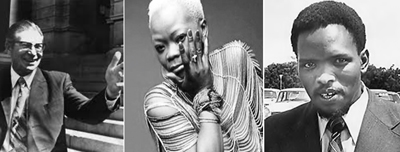Latest News Archive
Please select Category, Year, and then Month to display items
20 December 2021
|
Story Igno van Niekerk
|
Photo Igno van Niekerk
![]() Dr Samantha Potgieter, Senior Lecturer in the Department of Internal Medicine and Dr Nicholas Pearce, Senior Lecturer in the Department of Surgery comment on their team members’ commitment and determination during the pandemic.
Dr Samantha Potgieter, Senior Lecturer in the Department of Internal Medicine and Dr Nicholas Pearce, Senior Lecturer in the Department of Surgery comment on their team members’ commitment and determination during the pandemic.
On the forefront of the battle against the COVID-19 pandemic, two UFS doctors are leading a team of inspired healthcare workers in a superhuman effort to make a positive difference.
With the pandemic in its second year and the recurring challenges of new waves and strains consistently in the news, one would expect the doctors to be tired. However, quite the opposite is true. Upon entering the office where Dr Samantha Potgieter, Senior Lecturer in the Department of Internal Medicine and Dr Nicholas Pearce, Senior Lecturer in the Department of Surgery are in a meeting with colleagues, the debate is vibrant; an energetic sense of mission.
Miraculously succeeded
My brief is to collect stories and experiences they’ve had over the past 18 months at the Tumelo ward for general and high-care patients, where the team has miraculously succeeded in not running out of oxygen or ventilators, despite handling high volumes of patients from the Free State and Northern Cape. “We saw those pictures of piled-up bodies in Italy. We were committed to avoiding that at all costs. And we did.”
Success stories? First mentioned are their team members’ commitment and determination. The team had to stand in when families could not support dying patients. “They did not die alone. Our team was there.”
“Really sad and frustrating are the deaths that could have been prevented. Unvaccinated patients. They arrive ill, wanting to know if they can get it. Too late...” – Dr Nicholas Pearce
Then came hope
Sad stories? The past year has had its share of sad stories. “Someone comes in during the morning, needs oxygen, in the afternoon they are in ICU, then ventilator – and then they die. We’ve never faced anything like this before.”
Then came hope. Vaccines. Dr Pearce is in charge of the vaccination site at Universitas Hospital. “Really sad and frustrating are the deaths that could have been prevented. Unvaccinated patients. They arrive ill, wanting to know if they can get it. Too late ...” He opens his cell phone – shares the stats. “We can handle 2 000 vaccinations a day. At the moment about 250 comes in.” He shakes his head.
“We can beat this virus, but we need to stand together ...”
Understanding the nature of prominence
2014-03-14
|
 |
What did Hendrik Verwoerd and Steve Biko have in common? Or perhaps Johannes Kerkorrel and Brenda Fassie?
“They all possessed a certain natural predisposition to prominence,” says Prof Paul Fouche, reseacher in psychobiography at the University of the Free State’s Department of Psychology.
Prof Fouche and a team of researchers from other South African universities released findings on psychobiographical studies done on personalities that played a great role in our history.
The studies show that notable historical figures were very often prolific readers with a passion for literature since childhood. Generally, they also had a great love for nature and a sense of the sacredness of it, as well as a love for the cosmos.
The study further reveals that many of them were forced to take up leadership roles in the family from a very young age and were driven to succeed in order to take care of their own.
In many of these cases, there was a strong partner who supported the leader while they went about the business of governing their world.
Psychobiography is the systematic and descriptively-rich case study of renowned, enigmatic or even contentious individuals in socio-historical contexts within a psychological frame of reference. Over the past decade, psychobiography has become an established research genre and a methodology used by various academics and scholars in the field of life history research.